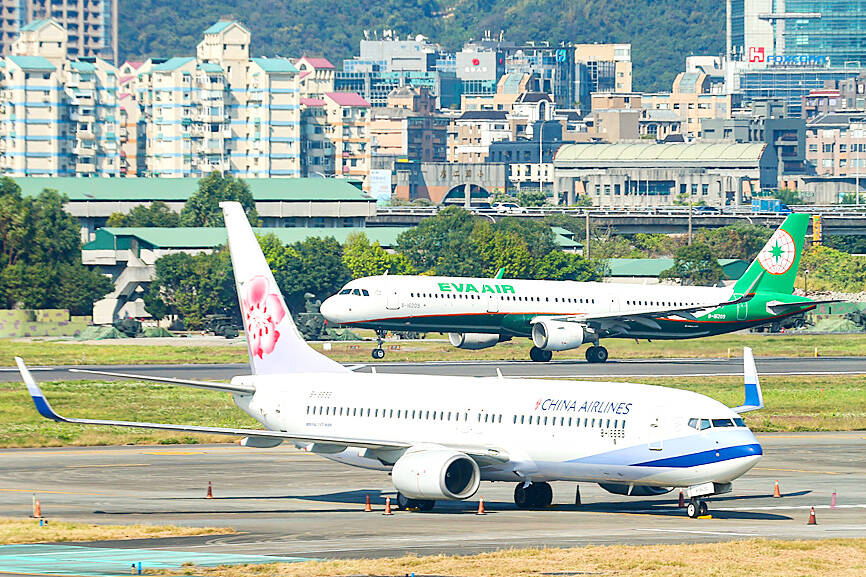China Airlines Ltd (華航) yesterday reported net profit for last year of NT$2.85 billion (US$92.5 million), down 70 percent from a year earlier, as rising operational costs weighed on its profitability.
That translated into earnings per share of NT$0.48, the nation’s flag carrier said.
Despite lower air cargo rates and intensifying competition in the passenger market, China Airlines’ revenue grew 8.5 percent annually to NT$150 billion last year, attributable to higher ticket prices in the passenger market and robust demand from consumers in the second half of the year, it said.

Photo: CNA
However, an increase in operational costs of 20 percent outpaced revenue growth, with costs totaling NT$139 billion, as aviation fuel costs increased 70 percent year-on-year, halving the airline’s gross margin from a year earlier, company data showed.
The airline said that its passenger revenue expanded 320 percent from a year earlier as Taiwanese airports resumed transit services in June last year and the government relaxed the nation’s border controls in October, the company said in a statement.
Its cargo revenue fell about 7 percent from a year earlier in light of competition from sea shippers, the company said.
China Airlines said it is upbeat about the passenger market this year and would increase the number of flights to earn more passenger revenue.
From later this month, the airline would provide more than 150 flights per week from Taiwan to Japan and South Korea, two of the favorite markets of Taiwanese travelers, it said.
The airline said it is planning to use wide-body Airbus SE 321neo aircraft for its Southeast Asian flights to gain more market share.
As it is planning to expand its offering of long-haul services, it would from next month increase the number of flights to Vienna and London, China Airlines said.
Passenger numbers on flights to North America have recovered to pre-COVID-19 pandemic levels, it added.
The company said it would take delivery of two new Boeing 777F jets to boost its efficiency, adding that it is planning to increase its flights to the US and Europe to maximize its air cargo revenue.
In related news, freight forwarder and logistics operator T3EX Global Holdings Corp (台驊國際投資控股) yesterday reported net income of NT$2.54 billion for last year, down 35 percent from a year earlier, as revenue fell 22 percent amid weaker demand.
T3EX Global’s earnings per share were NT$18.03, compared with NT$30.03 a year earlier, company data showed.

KEEPING UP: The acquisition of a cleanroom in Taiwan would enable Micron to increase production in a market where demand continues to outpace supply, a Micron official said Micron Technology Inc has signed a letter of intent to buy a fabrication site in Taiwan from Powerchip Semiconductor Manufacturing Corp (力積電) for US$1.8 billion to expand its production of memory chips. Micron would take control of the P5 site in Miaoli County’s Tongluo Township (銅鑼) and plans to ramp up DRAM production in phases after the transaction closes in the second quarter, the company said in a statement on Saturday. The acquisition includes an existing 12 inch fab cleanroom of 27,871m2 and would further position Micron to address growing global demand for memory solutions, the company said. Micron expects the transaction to

Nvidia Corp’s GB300 platform is expected to account for 70 to 80 percent of global artificial intelligence (AI) server rack shipments this year, while adoption of its next-generation Vera Rubin 200 platform is to gradually gain momentum after the third quarter of the year, TrendForce Corp (集邦科技) said. Servers based on Nvidia’s GB300 chips entered mass production last quarter and they are expected to become the mainstay models for Taiwanese server manufacturers this year, Trendforce analyst Frank Kung (龔明德) said in an interview. This year is expected to be a breakout year for AI servers based on a variety of chips, as

Global semiconductor stocks advanced yesterday, as comments by Nvidia Corp chief executive officer Jensen Huang (黃仁勳) at Davos, Switzerland, helped reinforce investor enthusiasm for artificial intelligence (AI). Samsung Electronics Co gained as much as 5 percent to an all-time high, helping drive South Korea’s benchmark KOSPI above 5,000 for the first time. That came after the Philadelphia Semiconductor Index rose more than 3 percent to a fresh record on Wednesday, with a boost from Nvidia. The gains came amid broad risk-on trade after US President Donald Trump withdrew his threat of tariffs on some European nations over backing for Greenland. Huang further

Sweeping policy changes under US Secretary of Health and Human Services Robert F. Kennedy Jr are having a chilling effect on vaccine makers as anti-vaccine rhetoric has turned into concrete changes in inoculation schedules and recommendations, investors and executives said. The administration of US President Donald Trump has in the past year upended vaccine recommendations, with the country last month ending its longstanding guidance that all children receive inoculations against flu, hepatitis A and other diseases. The unprecedented changes have led to diminished vaccine usage, hurt the investment case for some biotechs, and created a drag that would likely dent revenues and